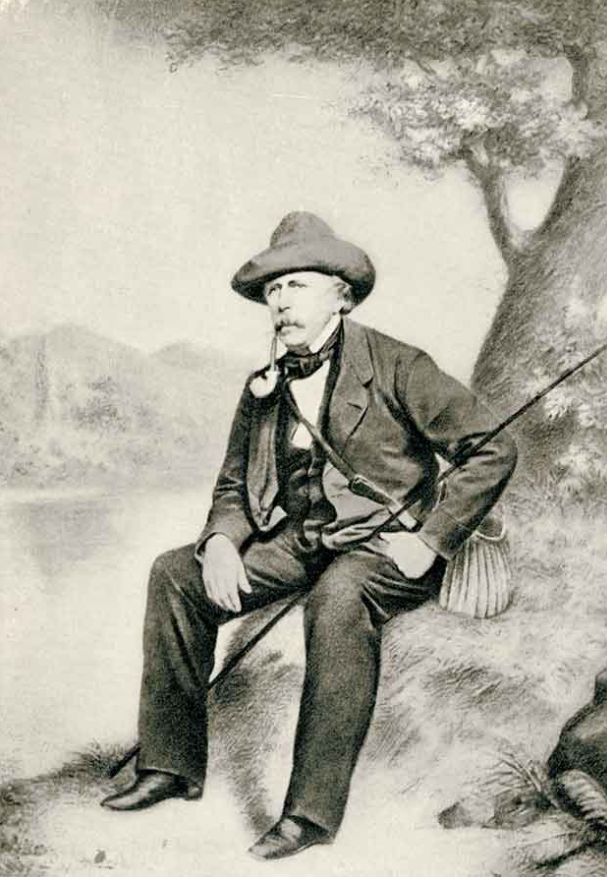A long time ago I read a story about the early French settler’s first discovery of smallmouth bass. They were intrigued by the tenacity and fight of this fish. As the story goes, their Native American guides used the word, “ouchigan,” and the French settlers logged that as the name of this new fish. The Algonquin word, “ouchigan,” translates as “fierce one.” So, whether they were describing smallmouth or calling them by name, we may never know.
The native range of smallmouth bass in the United States was once limited to the Great Lakes region and both the Mississippi and Ohio River drainages. Today, smallmouth bass can be found in almost every state within the lower 48. How this all transpired is an interesting story that has historical ties to canals and railroads along the East coast.
Once the Erie Canal was completed in the 1820’s, smallmouth began to spread out of its indigenous waters and further into streams and lakes in New York. Some anglers considered them a nuisance, as smallmouth competed with more flavorful species like trout and walleye. The game fishermen however, could not get enough of catching smallmouth, and they wanted more.
As river angling goes, those of us in the mid-Atlantic area realize just how great our river smallmouth fisheries are. When you consider the millions of us who live less than an hour away from great smallmouth fishing, it may be hard to conceive how some of these smallmouth fisheries came to be or how closely related rivers in Virginia, West Virgina, Maryland and Pennsylvania are.
For the majority of us who enjoy catching river smallmouth, a great deal of credit needs to be given to one man and his passion for fishing. As a sportsman and an author, Thaddeus Norris is best known as the Father of American Flyfishing, but his fishing passion, ideals and contributions would impact generations of future anglers. Norris was born in Virginia and moved to southeast Pennsylvania in his late teens. Like many of us, fishing has been a passion since our youth and this passion was evident his entire life.
Daily I am reminded how his efforts more than 150 years ago, have shaped the fisheries I love and enjoy today. Long before “finesse fishing” or “catch & release” became buzz words, Uncle Thad, as he was also known, would preach the value of lighter tackle and the critical importance conservation and releasing caught fish back into the rivers and streams he fished. The conversation of catch and release is still a challenging topic even today–can you imagine having the conversation in the 1800’s?
The impacts made by Thaddeus Norris were far greater than rod design, finesse fishing techniques and fisheries management principles. Uncle Thad was directly responsible for the smallmouth fisheries we have today in the Delaware and Susquehanna River basins.
As the historical accounts go, after experiencing how tenacious smallmouth bass were to catch, Mr. Norris approached the Pennsylvania Fish Commission in the spring of 1870 regarding stocking them in the Delaware River. At that time, the PA Fish Commission was actually called Pennsylvania Commission of Fisheries, which was founded just four years earlier. Norris obtained permission, raised funds from local sportsmen and in October of 1870, he purchased smallmouth bass from the Potomac River in Harper’s Ferry, WV at 25 cents each. Research suggests between 450 to 700 bass of various sizes were placed in large 15-gallon milk containers and shipped by railcar.
Norris and his associates accompanied the bass during transport and kept the water cool by adding ice and manually aerated the water using ladles. The 36-hour journey culminated with the cans being carted from the rail line by horse-drawn wagons to the Delaware River in Easton, Pennsylvania. The entire endeavor was said to cost $1,116.50.
Within just a few years, the bass had taken hold and anglers were catching smallmouth bass in numbers up and down the Delaware River. The program did so well that by 1873, Norris was approached by the Commission of Fisheries to do the same for the Susquehanna River. That year, Norris netted over 2,000 smallmouth bass from the Delaware River in Easton Pennsylvania and transported them to the Susquehanna River in similar fashion.
Word of Norris’s stocking took interest and according to Fish Commission historical notes, that around the same time, another group of anglers purchased 25 smallmouth bass from a hatchery in Havre de Grace, Maryland and introduced them into the watershed. As with the Delaware River, these initial stockings took hold and by the end of the 1870’s the Susquehanna River was producing bass in size and numbers.
Oddly enough, bass were introduced to the Potomac River in much the same way. In 1854, nearly 20 years earlier, a B&O railroad employee brought 20 smallmouth bass from the Wheeling River in West Virginia and transported them by railcar to the C&P Canal in Cumberland Maryland along the North Branch of the Potomac River. The bass took to the river and spread across the basin within a few years.
While Norris’s stocking gamefish by railcar using milk-containers might seem archaic, decades later in 1892 a railcar named the “Susquehanna” was built for the Commission for stocking and transporting bass, trout, walleye, shad, panfish and other species. Complete with a ladle and ice, the railcar employed a “messenger” whose job was to keep the containers cool and aerated. The “Susquehanna” transported fish across the state of Pennsylvania for 22 years and was even featured at the World’s Fair a time or two.
Regardless of where you fish for smallmouth, you are bound to cross railroad tracks along the way. When you do, be reminded of how closely our collective smallmouth fishery is tied to these rail lines.
Author Chris Gorsuch is a licensed charter guide in the state of Pennsylvania. He started the Reel River Adventures guide service in ‘07 and spends 225-250 days on the water annually. His home base is on the Susquehanna River where he operates 20’ jetboats.You can follow his daily fishing reports on Facebook ‘Reel River Adventures-RRA’ & Instagram @Chris_Gorsuch



